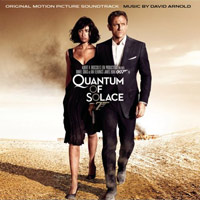
Quantum of Solace: Original Motion Picture Soundtrack
J
Ian Fleming’s James Bond franchise has a rich history of producing amazing, stylish action movies with interesting stories and compelling characters. Of course, there have been duds: some of the villains have been boring, some of the stories have been thin. As Bond is the longest running film franchise ever, it can be expected that there will be as many misses as hits. A parallel can be drawn between the pop songs contracted as themes for the movies.
For every title, a pop singer is chosen to compose, or merely sing, a theme. Sometimes the songs are engaging and interesting: the gold plated brass of “Goldfinger” by Shirley Bassey, the melancholy guitar of “You Only Live Twice” by Nancy Sinatra, the hard charging chorus of “Live and Let Die” by Paul McCartney, for example. And some of the theme songs are boring duds: Chris Cornell’s adult rock contemporary “You Know My Name” (from 2006’s Casino Royale) or Madonna’s disgustingly digitally processed “Die Another Day.” For Quantum of Solace, the latest entry in the 007 canon, Jack White and Alicia Keys were chosen to contribute, marking the first duet in Bond theme history. White wrote, produced, played guitar and drums, and sang along with Keys. And because of the questionable title of the film (at least in terms of songwriting here), White went with a tried and true theme for the lyric: dying. White’s trademark grizzly fuzz guitar starts “Another Way To Die” like a TNT fuse fizzing towards the huge horn explosion, keeping with the classic ’60s sound of some of the best Bond themes. The Memphis Horns accompany White and Keys, adding another layer of badass to the Zeppelin-esque funk, and Keys’ keys pop in and out at the stops. Vocally, Keys and White sound eerily alike, as if they were made to sing together. Though it might be too much of a good thing if they collaborated on a record, judging from this single it might actually be worth hearing.
David Arnold (British, composed soundtracks for Stargate, Independence Day, and much more) handled the rest of the soundtrack, his fifth Bond film. Usually, the composer has a simple job: incorporate John Barry’s original “James Bond Theme” in as many interesting ways as possible, soft for the parts when he meets up with the girl, wistful as he leaves her to go meet Q, and tough as he beats on Oddjob or Jaws. Arnold takes a different angle, as this Bond film is much more action and much less picnicking with a brunette and drinking Dom Pérignon. As a stand-alone record, the soundtrack is nearly impossible to listen to while sitting still. Arnold is so skilled at musically capturing the frantic action on-screen that when “Somebody Wants To Kill You” or “Target Terminated” pops up on the iPod, you will walk a little faster, then break out into a run, then a full on sprint in time with the skittery drums, checking over your shoulder with each cymbal crash or horn crescendo. All in all, it’s perfect for the film, though, it might make you a little paranoid listening to it at home alone.
Michael P. O’Shaughnessy

Faunts Remixed
Friendly Fire
It may seem easy to lump Faunts together in the same gaggle as other post-rock bands hailing from Canada. After their first two records, that’s where most people left them. However, this remix album certainly adds some distinction, and proves that their music is good, especially without using distortion-heavy guitar as a crutch, like so many of their peers.
Faunts Remixed is exactly what the title implies: a bundle of tracks from previous releases—High Expectations/Low Results and M4—that have been reworked by several of Faunts’ musical friends. Contributors range from hip-hop artists like Cadence Weapon, to the synth-happy San Serac. Hell, Faunts even took the time to remix one of their own tracks. Each artist adds their own flair and finesse to Faunts’ ethereal sound, giving personality and warmth, without suffocating the original track.
Although it may be tedious to some listeners, many of the tracks appear twice, remixed by different artists. Intended or not, the inclusion of two remixes adds another, more personal layer to the album, while further accenting each artist’s influence. Highlights include the hauntingly beautiful “Gone With The Day” remix by Graham Lessard, as well as the Justice-esque Paranomasiac reworking of “M4 (Part III).”
Faunts Remixed is a great example of how to do a remix album, reworking the songs to add depth and a personal spin,\ while leaving the integrity of the track intact, which is where many others have failed (excuse me, Ratatat?). While Remixed technically offers no new insight to the merits of Faunts’ work, it’s certainly a pleasurable gap-filler as we await the release of their next album, Feel.Love.Thinking.Of. which is due sometime in February.
Jennifer Farmer
MP3: “Memories of Places We’ve Never Been (TH White Remix)”

Barefoot in the Disenchanted Forest
Peanut Butter and Smelly
For the last five years Columbus has bred a strain of pop that, for lack of a better term, could be referred to as “Raffi-core.” From the banjo nursery rhymes of Jordan O’ Jordan to the bric-a-brac jangle of Terribly Empty Pockets, there’s a particular trend towards conjuring up juvenile ephemera with eccentric pop ambition. Super Dessert’s unassuming debut, Barefoot in the Disenchanted Forest, is of a magnified twee design even before you put the record on: cased in a picture book that most resembles readers from the Little Golden library (remember the Poky Puppy?) and facsimiles of Candyland game boards. Knowing full and well that this would be the over-saturated pinnacle of the kiddie music craze, it was half tempting to skip through without a care. If these extremely talented musicians weren’t going to take this all too serious, why then should the listener? Good thing I stayed on task as the Super Desserts, though indebted to things like the magic of puppeteers, Peter and the Wolf, and the Telletubbies soundtrack, transcend cutesy speculation by weaving a wide swath of instrumentation into a continuous pop buffet.
Even as many of the songs here revolve around the communal jamboree of the Elephant Six’s most endearing moments, the eclectic troupe find inspiration in bands as disparate as the Magnetic Fields and the Carter Family, from composers like Bernard Herrmann and Irving Berlin. Wrapped inside what I suppose (judging from the definitely too twee song titles) is a concept involving Christian youth camps, great grandma’s funeral and woodpeckers are sing-a-longs created with oboes, glockenspiels, banjo, handclaps, church bells, and even sitars. Somehow it all works together, making highlights like “Under the Guise of Darkness, Clara’s Hands Look Like Ninja Stars” extra-buoyant when they appear out of orchestral segues and goofy outros. Obviously the band went for broke on this, their debut, but the Langley School-gone-psychedelic atmosphere of this one hints that in the future the band is capable of whittling it down into an even more adventurous statement.
Kevin J. Elliott
MP3: “Under the Guise of Darkness, Clara’s Hands Look Like Ninja Stars”

$1,99
Verge
Conceptually, the idea of Brazilian hip-hop seems a hit or miss proposition. The country’s musical heritage of bossa nova, samba and tropicalia is wondrous wealth of rhythmic influence, but bending it to meet the urbane sounds of hip-hop could be disastrous in the wrong hands, an Arrested Development–Putumayo hodgepodge of the worst proportions.
But that’s the chosen path of Rio de Janero’s A Filial on their debut, $1,99. The group takes several flavors of their native music, old-school hip-hop beats, and juxtaposes rhymes in both Portuguese and English. (MC Ben Lamar grew up in Chicago.)
It’s hard to tell, though, if the album’s better than it could have been or worse than it should have been. Either way, it’s decidedly varied in its end results, effortlessly pulling together pieces from the group’s multi-culti bag of tricks one moment, and struggling for cohesion—or at least not to sound corny—the next. “Calma Pedro” takes a big bass beat and underscores it with a tribal rhythms, successfully coming off like Run DMC had they come from a favela instead of Queens. Equally successful, “Brown Suéter” pours together samba, jazzy horns and crackin’ beats in one fluid stream. But mimicking the Fat Boys while rapping about ending world hunger is a bad combination. And “Like a Baby’s Kiss” is a Giant mis-Step of bossa nova croon and hokey rap. Give A Filial credit for taking the plunge, even if they aren’t capable of making a splash.
Stephen Slaybaugh

Universal Mind Control
G.O.O.D./Geffen
Was it really time for Common’s Neptunes album? Did the moment really seem right, now that the N.E.R.Ds are most likely to be seen working with either FAM-LAY or Ashlee Simpson? What the fuck?! Maybe it’s because he’s too caught-up in his acting career to write rhymes, or maybe he’s just got too much weed money these days. I’m gonna come right out and say it: skip this one. There isn’t a single cut that’ll make it to your “My Favorite Common Songs” mixtape. Allow me to ellaborate.
“UMC” is Common’s first-ever club track. It’s about being fly. Ridiculously enough, it’s the best track on the record, and the many ‘80s flashbacks here will have you making like Bugaloo Shrimp. Resist that urge, please. Track two, “Punch Drunk Love,” is the moment that Kanye West officially became completely played-out. He snarls “I already know I’m too fly” again and again over some mid-90s, NPG-era drum-track that Prince must’ve sold to the Neptunes for five dollars and an autographed Justin Timberlake CD.
“Make My Day” sounds like it was produced by Jive Bunny & the Mastermixers. Seriously. Shut-up Cee-lo. We’re tired of your shtick too. And try to imagine someone actually having sex to the herky-jerky beat of “Sex 4 Suga” while Common raps “I don’t mind being behind, cause I’ma touch you where the sun don’t shine.” Hilarious.
The second half of the record is marginally more interesting. At least on “Gladiator” and “Announcement,” Common sounds like he’s not actually asleep in the booth, even if he does let Pharrell (Pharrell!) take him to school and back again in a single verse. “Changes” and “Inhale” must be right next to each other because not even Common could tell them apart, and “What a World” explicitly references Queen and Blondie while lifting the vocal melody of “Rapper’s Delight.” And the hook is courtesy of Chester French, a band that was the subject of a bidding war between Pharrell and K-West. Yeah, they’re that bad.
Common doesn’t even show up on the last track, “Everywhere,” until 90 seconds into it. But when he does, he does something truly remarkable. For one glorious measure, he breaks from the pit-pit-pit-patter rhythm he’s stuck to through all of the previous 10 tracks. Finally, as if to prove my point, the iTunes download includes a live version of “Break My Heart,” a track from Common’s last bad album that suddenly shines anew as a welcome relief from the half-baked, leftovers-at-the-back-
of-the-fridge, “I’d rather listen to silence than you holla” disappointment that is Universal Mind Control.
Matt Slaybaugh
ALBUM REVIEWS
K-The-I???, Yesterday, Today & Tomorrow
The Secret History, Desolation Town EP
Hills of Elysium, Cigadent
Windy & Carl, Songs for the Broken Hearted
Kanye West, 808s and Heartbreak
Dido, Safe Trip Home
Black Milk, Tronic
The (International) Noise Conspiracy, The Cross of My Calling
Los Campesinos!
We Are Beautiful, We Are Doomed
Mike Rep and the Quotas, Songs the Grackles Liked EP
Frida Hyvönen, Silence Is Wild
Isobel Campbell & Mark Lanegan, Sunday at Devil Dirt
The Dead C, Secret Earth
Wintersleep, Welcome to the Night Sky
